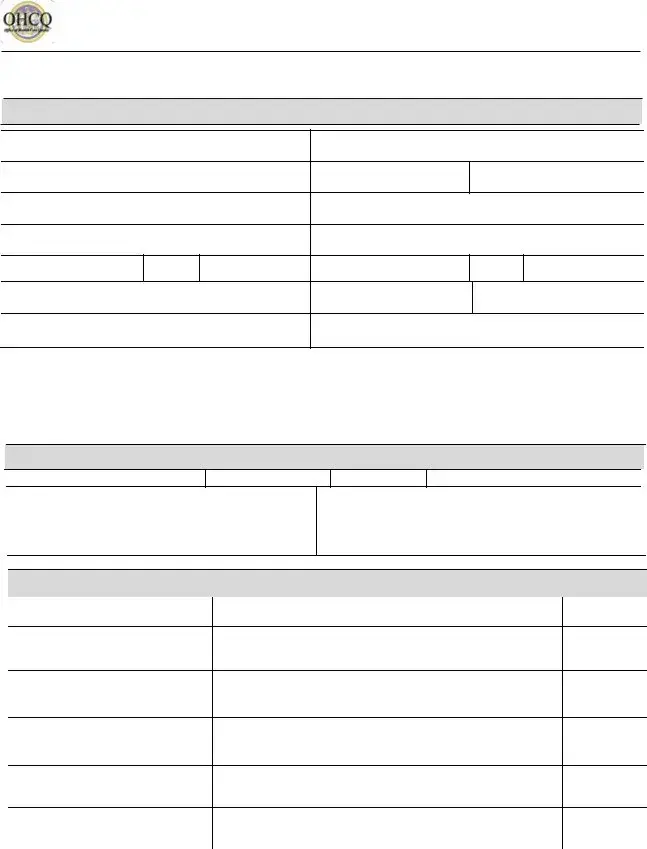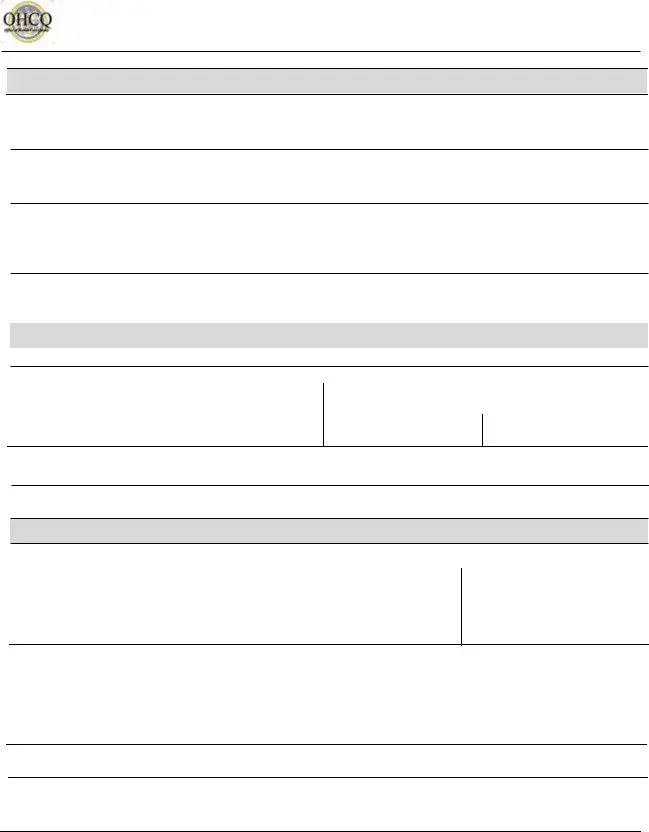Maryland Rsa PDF Template
In the state of Maryland, the journey to starting a Residential Service Agency (RSA) involves navigating through a series of detailed and essential steps, as outlined by the Maryland Department of Health and Mental Hygiene's Office of Health Care Quality (OHCQ). For entrepreneurs and organizations looking into offering skilled nursing and aide services, understanding the Maryland RSA form is the first step toward achieving this goal. This comprehensive guide essentially walks applicants through a carefully structured process starting with a non-refidential license fee, submission of organizational charts, development of policies and procedures in accordance with COMAR 10.07.05 RSA regulations, assembly of sample personnel and patient files, and a precise outline of the scope of services. The application process emphasizes the importance of preparation for an on-site survey to ensure compliance with state standards. Additionally, the provisional license phase, subsequent patient admissions, and the rigorous on-site evaluation by OHCQ nurse surveyors are crucial milestones. The framework also highlights the necessity of having a remediation plan ready for any deficiencies identified, underscoring the rigidity of the 90-day provisional licensure period. Moreover, navigating budgetary constraints and understanding the limitations of provisional licenses, especially regarding Medicaid reimbursements, are highlighted as significant aspects of the process. Equally important is the guidance offered for setting up the business and the operational requirements, such as the supervision of certified nursing aides. This introduction to obtaining a Residential Services Agency license in Maryland unveils the intricate but navigable path towards contributing to the health and wellness of the state's residents, underlining the rigorous but rewarding process of establishing a compliant and effective residential service agency.
Maryland Rsa Sample

DEPARTMENT OF HEALTH AND MENTAL HYGIENE |
Form Approved May 2018 |
OFFICE OF HEALTH CARE QUALITY |
MDH Form AC.APP.1.1.IN.RSAO.2 |
INSTRUCTIONS FOR COMPLETION OF RESIDENTIAL SERVICE
AGENCY (RSA) LICENSURE APPLICATION
A Residential Service Agency (RSA) is a business that employs or contracts with individuals to provide at least one home health care service for compensation to an unrelated sick or disabled individual. This application is to receive a state license for a RSA from the Maryland Department of Health, Office of Health Care Quality (OHCQ). The RSA program is NOT a Medicare program. Current regulations for the RSA program can be found in Code of Maryland Regulations (COMAR)
10.07.05.For more information relating to RSAs visit the OHCQ Residential Service Agency Dashboard at
https://app.smartsheet.com/b/publish?EQBCT=85e22fc816cc4cc0a30f1b5a41f5146e
APPLICATION FOR INITIAL LICENSE PROCESS
To apply, first download the application onto your computer. You will be able to complete the application electronically or you can print it out and hand write the information into each appropriate section. Additional information for each required section can be found below.
REQUIRED SECTIONS
Please complete each section based on the following information:
Section 1 - General Information: Detail your agency’s information including: The legal agency name, trading name (Doing Business As (DBA)), agency’s email, phone number, fax number, agency’s business address (for the physical location), mailing address (if different from the business address), agency’s license number, agency’s FEIN (Federal Employer Identification Number), agency administrator, agency after hours emergency contact information, and agency’s business hours. Please note, for agencies with multiple locations provide the address and contact information for the agency’s main office. Branch office location information will be collected in Section 7.
Section 2 - Ownership: Include information related to your agency’s ownership: type of business organization of disclosing entity (sole proprietorship, partnership (including LLP), limited liability company (LLC), and corporation), name and address of ownership, the name, title, address and percentage of the agency owned by each owner, the agency’s president (if Corporation) or manager’s (if LLC) name, contact information, and address, and FEIN (Federal Employer Identification Number). If the ownership is a corporation, provide the date of Articles of Incorporation. If ownership is LLC provide the date of Articles of Organization.
Section 3 - Background: Respond “yes” or “no” to the background questions listed in Section 3 of the application. For Section 3 Questions 1 through 3 that you have answered “yes”, provide a detailed explanation (including: dates, type of license, agencies, violations, or offenses).
Section 4 – Worker’s Compensation: First identify if the agency has employees. If the agency has employees, provide the agency’s worker’s compensation insurance policy number, binder number, name of insurance company, policy’s effective date, and the policy’s expiration date. Additionally, attach a copy of the agency’s worker’s compensation insurance policy to the application (This can be added to the application electronically as an attachment). If your agency does not have workers’ compensation insurance AND does not have any employees, submit a Letter of Exemption (sole proprietorships or partnerships) or Certificate of Compliance (corporations or LLCs) from the Certificate of Compliance Coordinator at the Workers’ Compensation Commission. Additional information can be found under the Resource Links section of the OHCQ RSA Dashboard (see link above).
DHMH Form AC.APP.1.1.IN.RSAO.2 (9/13) |
Instructions |

DEPARTMENT OF HEALTH AND MENTAL HYGIENE |
Form Approved May 2018 |
OFFICE OF HEALTH CARE QUALITY |
MDH Form AC.APP.1.1.IN.RSAO.2 |
|
|
Section 5 – RSA Services: For this section please select all of the home care services to be
provided. The home care services include: Durable Medical Equipment (DME), Durable Medical Equipment with Oxygen, Therapy Services including speech therapy, occupational therapy, and physical therapy, Medical Social Services, Nutritional Services, Intravenous therapy, Skilled Nursing and Aides Only, Ventilator Services, or Skilled Nursing. If you selected the “Skilled Nursing and Aides Only” service, please provide the level of home care services that your agency will be providing. The levels include: 1. Level One: RN supervision of Aides without medication management, 2. Level Two: RN supervision of Aides with medication management, or 3. Level Three: Complex care provided by RN, LPN, and RN supervision of Aides (e.g. Wound Care, Tube Feeding, Trach Care, Vent Management, Intravenous or Related Therapies, etc.). Next, select if the agency is “for profit” or
Section 6 – Addendum – Branch Offices: “Branch office” means a satellite office of an RSA that is operated by the same person, corporation, or other business entity that manages the parent RSA, and has the same name of the parent RSA:
1.Ownership tax identification number as the parent business entity;
2.
3.Policies and procedures; and
4.Provides services within the same geographic area served by the parent business entity.
Provide your agency’s licensed name and license number. Select “yes” if your agency operates any branch offices. Select “no” if your agency does not operate any branch offices. If you answered “yes”, provide the address and phone number for each of the agency’s branch offices.
Section 7 - Affidavit: If the program is going to be in more than one applicant’s name, each applicant’s signature is required. Provide the signature of each applicant, his/her title, and the date the application was signed by that applicant. This signator agrees under the penalties of perjury that the information given in this application is true. This applicant’s signature also certifies that your agency follows the administrative and procedural requirements pertaining to the Code of Maryland Regulations (COMAR) 10.07.05. Additionally, you are accepting responsibility to notify OHCQ if there are any future substantive changes in the agency and operation, and that written notice will be given before the effective date of the change. The signators also swear and affirm that each applicant is over the age of 21, is fully competent, and understands the terms of this application.
REQUIRED DOCUMENTATION
In addition to a completed application, additional supporting documents are required to finalize your application. See below for a list of additional documents that are required for each RSA licensure type.
1.An organizational chart that includes all positions with the name of the person in that position.
2.Policies and procedures as required by COMAR 10.07.05.
3.A business plan as required by COMAR 10.07.05.
4.A sample personnel file.
5.Sample patient files for adult and pediatric patients (if applicable).
DHMH Form AC.APP.1.1.IN.RSAO.2 (9/13) |
Instructions |

DEPARTMENT OF HEALTH AND MENTAL HYGIENE |
Form Approved May 2018 |
OFFICE OF HEALTH CARE QUALITY |
MDH Form AC.APP.1.1.IN.RSAO.2 |
Suggested Format for Writing Policy and Procedure Statements: When developing your agency’s policies and procedures, the following elements are recommended:
1.Date of approval by governing body.
2.Title or subject of the policy. (Example: Employee Orientation)
3.Policy statement. Describe the agency’s policy on the subject. (Example: All employees shall receive orientation prior to assuming responsibilities for the position.)
4.Purpose of the policy. Describe why the subject is important. (Example: To assure staff understand and comply with all agency policies and procedures.)
5.Procedures. Define who, when, and where. (Example: Who will be responsible? What materials will be used?
How will participation in orientation be documented?)
Suggested Format for Writing Job Descriptions: When developing your agency’s job descriptions, the following elements are recommended:
1.Date of approval by governing body.
2.Position title. (Example: Nursing Supervisor)
3.Position to which this job title reports. (Example: Reports to Director of Nursing)
4.Qualifications. Educational and experience requirements. (Example: Graduation from accredited school of nursing. Number of years of home health experience. Number of years of supervisory experience.)
5.Credential requirements. (Example: Current license in the State of Maryland) Job responsibilities. List the tasks that the person in this position would have to perform. (Example: Perform annual performance evaluations on all licensed nurses and home health aides. Participate in quality assurance activities.)
APPLICATION FINALIZATION
Electric Submission: To submit the completed application and all supporting documentation electronically to OHCQ, visit the OHCQ RSA Dashboard and click on the RSA Licensure Application Form (https://app.smartsheet.com/b/form/26fb6697dcc841b7ae8fde911eec9b05). Complete the form with the following information: Name of RSA, type of RSA, contact information for the agency’s contact person including: Name, Position, email address, phone number, and secondary phone number. Next, upload the following documents to the form:
1.Completed application
2.Organizational chart
3.Policies and procedures
4.Sample personnel file
5.Sample patient file for adult and pediatric patients
6.Business Plan - Scope of services
7.Worker's compensation documentation
DHMH Form AC.APP.1.1.IN.RSAO.2 (9/13) |
Instructions |

DEPARTMENT OF HEALTH AND MENTAL HYGIENE |
Form Approved May 2018 |
OFFICE OF HEALTH CARE QUALITY |
MDH Form AC.APP.1.1.IN.RSAO.2 |
Finally, select the “Attestation” box confirming that all the information in the application and supporting documents are correct and true. If you would like to have a copy of the form and attachments sent to your email, please select the “Send me a copy of my responses”. It is recommended that you keep a copy of your responses and documents for your own records. Once your application is submitted you will receive email updates regarding your pending application. The total processing time of the application should take 2 to 3 months after all documents are received.
Paper Submission: To submit a hard copy of the application and supporting documents please
return in person or via mail to the following address: Ambulatory Care Program, Office of Health Care Quality, Bland Bryant Building, Spring Grove Hospital Center, 55 Wade Avenue, Catonsville, MD 21228. Once submitted the application is submitted it will take 6 or more months to process.
LICENSE NOTIFICATION
All application notifications and process updates will be made by email. If no email is provided there may be an additional
Once your application has been approved, a formal approval or denial letter will be mailed to your agency from OHCQ through the mail. If your agency is approved, an operating license will be sent to your agency with effective date.
ADDITIONAL INFORMATION
To add services to your RSA you must submit a new application to the OHCQ for review and approval with required updates to the policies and procedures. This process can take up to 3 to 4 months if submitted electronically, and up to 6 months if submitted on paper.
If you do not intend to continue with your license, you must return your operating license to OHCQ.
An unannounced
If you are operating an unlicensed RSA program, your Medicaid provider number and reimbursement are in jeopardy of termination.
RSA HOTLINE
In accordance with State regulations, the State of Maryland has established a RSA Hotline. The purpose of the Hotline is:
To receive complaints about local RSAs; To receive questions about local RSAs; and
To lodge complaints concerning the implementation of advance directives.
The Hotline number is
QUESTIONS
Please visit the OHCQ RSA Dashboard
(https://app.smartsheet.com/b/home?lx=WI2JkCnlI1Ng9CuRw1DP7ynUXphoZCJbZcV5Sw9DPzI) or contact
DHMH Form AC.APP.1.1.IN.RSAO.2 (9/13) |
Instructions |

MARYLAND DEPARTMENT OF HEALTH (MDH)
OFFICE OF HEALTH CARE QUALITY (OHCQ)
RESIDENTIAL SERVICES AGENCY (RSA) APPLICATION FOR LICENSURE
1. GENERAL INFORMATION
LEGAL AGENCY NAME |
|
|
TRADING NAME (DBA) |
|
|
|
|
PHONE NUMBER |
FAX NUMBER |
||
BUSINESS ADDRESS (physical location) |
|
MAILING ADDRESS (if different) |
|
|
|
NUMBER, STREET |
|
|
NUMBER, STREET |
|
|
CITY |
STATE |
ZIP |
CITY |
STATE |
ZIP |
COUNTY |
|
|
LICENSE NUMBER (if applicable) |
FEIN NUMBER |
|
NAME OF ADMINISTRATOR (Last, First, Middle Initial) |
AFTER HOURS/EMERGENCY CONTACT NUMBER |
||||
BUSINESS HOURS (in HH:MM format) |
|
|
|
|
|
||
|
SUNDAY |
MONDAY |
TUESDAY |
WEDNESDAY |
THURSDAY |
FRIDAY |
SATURDAY |
FROM: |
|
|
|
|
|
|
|
TO: |
|
|
|
|
|
|
|
2.OWNERSHIP (Type of business organization of disclosing entity)
SOLE PROPRIETORSHIP |
PARTNERSHIP |
LLC |
CORPORATION |
NAME |
|
ADDRESS |
|
NAME(S), TITLE(S), AND ADDRESS(ES) OF OWNER(S) AND PERCENTAGE OWNED IF 2% OR MORE
(Attach additional pages if needed.)
NAME AND TITLE |
ADDRESS |
PERCENTAGE |
OWNED |
|
NAME OF PRESIDENT (IF CORPORATION) OR MANAGER (IF LLC) |
|
PHONE NUMBER |
CELL NUMBER |
|
|
|
|
|
|
|
|
ADDRESS (number, street) |
|
CITY |
STATE |
ZIP |
|
|
|
|
|
|
|
IF CORPORATION, DATE OF ARTICLES OF INCORPORATION: |
|
FEIN |
IF LLC, DATE OF ARTICLES OF |
|
|
|
|
|
ORGANIZATION |
|
|
|
|
|
|
|
DHMH Form AC.APP.1.0 (6/1 |
1 |
|
|
Last Revised: May 2018 |
|

MARYLAND DEPARTMENT OF HEALTH (MDH)
OFFICE OF HEALTH CARE QUALITY (OHCQ)
3.BACKGROUND
1.Has any owner, officer, director, agency, or managerial staff had a license revoked, suspended, or denied by the
DHMH within the last five years? No Yes (explain)
2. Does the parent company, owner, agent, officer, or managerial staff own or operate a health carefacility/agency
licensed or surveyed by the OHCQ? |
No |
Yes (explain) |
3. The agency hereby attests that it is in compliance with The Civil Rights Act of 1964; The Rehabilitation Act of
1973; The Americans with Disabilities Act of 1990; and The Drug Free Workplace Act of 1988. No Yes (explain)
4. Have the owners, officers, directors, agents, or managerial staff been convicted of a criminal offense involvingany
program under Title 18, 19, or 20 of the Social Security Act? |
No |
Yes |
||
|
|
|
|
|
4. WORKERS’ COMPENSATION |
|
|
|
|
|
|
|
|
|
Do you have any employees? |
Yes |
No |
|
|
If you answered YES, attach a copy of your workers’ compensation insurance policy and complete the following:
POLICY NUMBER |
BINDER NUMBER |
|
|
|
|
INSURANCE COMPANY |
EFFECTIVE DATE |
EXPIRATION DATE |
If you answered NO, additional documentation from the Workers’ Compensation Commission must accompany this application (refer to the instruction guide for details).
5. RSA SERVICES
HOME CARE SERVICES TO BE PROVIDED (check all that apply)
Durable Medical Equipment |
Medical Social Services |
Durable Medical Equipment w/ Oxygen |
Occupational Therapy |
Intravenous or Related Therapies |
Physical Therapy |
Skilled Nursing and Aides Only* |
|
|
|
Skilled Nursing
Speech Therapy
Ventilator Services
*If you have selected Skilled Nursing & Aides Only please indicate what level of home care services will be provided (check only one level) HOME CARE SERVICES TO BE PROVIDED (check only one level of care)
Level One: RN supervision of Aides without medication management
Level Two: RN supervision of Aides with medication management
Level Three: Complex care provided by RN, LPN and RN supervision of Aides (e.g. Wound Care, Tube Feeding, Trach Care, Vent Management, Intravenous or Related Therapies, etc.)
CATEGORY |
|
For Profit |
LIST THE TYPE(S) OF COMPLEX CARE TO BE PROVIDED BY YOUR AGENCY:
DHMH Form AC.APP.1.0 (6/1 |
2 |
Last Revised: May 2018 |

MARYLAND DEPARTMENT OF HEALTH (MDH)
OFFICE OF HEALTH CARE QUALITY (OHCQ)
6. ADDENDUM - BRANCH OFFICES
|
LICENSED NAME |
|
|
LICENSE NUMBER |
|
|
|
|
|
|
|
|
|
|
|
|
|
|
|
|
DOES THE AGENCY OPERATE ANY BRANCH OFFICES? |
No |
|
Yes (list all below) |
|
|
|
|
|
|
STREET ADDRESS |
|
|
CITY |
STATE |
ZIP |
PHONE NUMBER |
|
|
|
|
|
|
|
MD |
|
|
|
|
|
|
|
|
|
|
|
|
|
|
|
|
|
|
|
MD |
|
|
|
|
|
|
|
|
|
|
|
|
|
|
|
|
|
|
|
MD |
|
|
|
|
|
|
|
|
|
|
|
|
|
|
|
|
|
|
|
MD |
|
|
|
|
|
|
|
|
|
|
|
|
|
|
|
|
|
|
|
MD |
|
|
|
|
|
|
|
|
|
|
|
|
|
|
|
|
|
|
|
MD |
|
|
|
|
|
|
|
|
|
|
|
|
|
|
|
|
|
|
|
MD |
|
|
|
|
|
|
|
|
|
|
|
|
|
|
|
|
|
|
|
|
|
|
|
|
7. AFFIDAVIT
I solemnly affirm under the penalties of perjury and upon personal knowledge that the contents of the foregoing application are true. I understand that the falsification of an application for a license may subject me to criminal prosecution, civil money penalties, and/or the revocation of any license issued to me by the DHMH. In addition, knowingly and willfully failing to fully and accurately disclose the requested information may result in denial of a request to become licensed or, where the entity already is licensed, a revocation of that license.
I certify that this agency is in compliance with administrative and procedural requirements pertaining to the Code of Maryland Regulations (COMAR) 10.07.05.
I further certify that I will notify the OHCQ if there are any future substantive changes in agency and operation, and that written notice will be given before the effective date of the change.
I hereby swear and affirm that I am over the age of 21 and I am otherwise competent to sign this Affidavit.
If the program is going to be in more than one applicant’s name, each applicant’s signature is required. required.
SIGNATURE OF APPLICANT |
TITLE |
DATE |
|
|
|
SIGNATURE OF APPLICANT |
TITLE |
DATE |
|
|
|
SIGNATURE OF APPLICANT |
TITLE |
DATE |
|
|
|
SIGNATURE OF APPLICANT |
TITLE |
DATE |
|
|
|
FOR OFFICE USE ONLY
INITIALS
DATE
DHMH Form AC.APP.1.0 (6/1 |
3 |
Last Revised: May 2018 |
File Breakdown
| Fact Name | Detail |
|---|---|
| Governing Law | COMAR 10.07.05 RSA Regulations |
| Licensure Fee | $500.00 non-refundable fee |
| Application Requirement | Inclusion of an organizational chart |
| Policies and Procedures | Development required as per COMAR |
| Provisional License | Issued for 90 days with specific pre-requisites |
| Patient Admittance | Must admit 3-5 patients within 45 days of provisional licensure |
| Initial Survey | Involves review of agency's policies, records, and patient care |
| Deficiency Correction | Written plan of correction required within 10 working days of deficiency report |
Steps to Filling Out Maryland Rsa
Once you've made the decision to apply for a Residential Services Agency (RSA) license in Maryland, it's important to follow the outlined steps diligently. The process includes submitting your application along with several crucial pieces of documentation to demonstrate your agency's readiness and compliance with state regulations. By meticulously gathering all required documents and information beforehand, you can navigate the process smoothly and efficiently. Here's what you'll need to do:
- Verify that you have a clear understanding of the requirements as described by the Maryland Department of Health and Mental Hygiene's Office of Health Care Quality (OHCQ).
- Collect the necessary documentation, including an organizational chart of your agency, development of policies and procedures, sample personnel and patient files, and a scope of services document.
- Prepare a non-refundable licensure fee of $500.00. Make sure this fee is ready to be submitted with your application packet.
- Visit the Division of State Documents website or your local library to obtain a copy of the Code of Maryland Regulations (COMAR) relevant to RSA regulations, as these will not be available for purchase from OHCQ.
- Complete the RSA licensure application form provided in the packet. Ensure you fill out every section, including:
- The official name and trading name (dba) of your agency.
- Both the business and mailing addresses.
- Contact information including phone numbers, email address, and emergency/after-hours number.
- The name of the administrator and their title.
- Indicate the type of home care services your agency will provide by checking the appropriate level of care.
- Specify if your agency is for-profit or non-profit and the type of ownership.
- List all individuals with 2% or more ownership if applicable.
- Attach the prepared $500.00 non-refundable application fee to your completed application.
- Mail the completed application packet, including all required documents and fee, to the address provided on the application form.
After mailing your application, what comes next involves a waiting period during which your documentation and readiness will be reviewed. Should your application meet the initial requirements, an on-site survey of your agency will be scheduled. This survey is a critical part of verifying the implementation of your policies and procedures, and assessing your agency's preparedness to serve patients. Depending on the outcome of this survey and subsequent steps including the review of patient and personnel records, you might be issued a provisional license. Remember, acquiring a provisional license is just the beginning. Following the provisional period, further scrutiny into your agency's operations and the care provided will determine if a full license can be granted. Keep in mind, getting to this stage requires thorough preparation, adherence to state regulations, and an unwavering commitment to quality care.
More About Maryland Rsa
What is a Residential Services Agency (RSA) license in Maryland?
In Maryland, an RSA license authorizes an entity to provide residential health services, such as skilled nursing and aide services, to individuals in their homes. It is regulated by the Maryland Department of Health and Mental Hygiene, specifically through the Office of Health Care Quality. Obtaining this license involves a thorough application process, adherence to specific state regulations, and an on-site survey by state health officials.
What are the requirements for obtaining an RSA license?
To obtain an RSA license in Maryland, applicants must complete several key steps:
- Submit a completed application packet along with a $500 non-refmissable licensure fee.
- Provide an organizational chart detailing all positions and the names of current holders.
- Develop and submit policies and procedures as required by COMAR 10.07.05, RSA regulations.
- Assemble sample personnel and patient files (for both adults and pediatric patients, if applicable).
- Outline the scope of services to be offered, including the geographic area of service, accepted referral sources, and accepted payer sources.
- After receiving written approval, hire staff and market to acquire the required 3-5 clients.
- Submit a Statement of Readiness along with necessary documentation for a provisional license.
How long does it take to get an RSA license in Maryland?
The duration to receive an RSA license may vary based on several factors, including the completeness of the application packet, the need for a provisional license, and the scheduling of an onsite survey. However, due to budgetary constraints, there may be a delay of up to 9 months for the issuance of provisional licenses for new or upgrading Residential Service Agencies.
Can an RSA apply for Medicaid reimbursement with a provisional license?
No, an agency cannot apply for Medicaid reimbursement with a provisional license. To be eligible for Medicaid reimbursement, an agency must have a full twelve-month license, obtained after passing all required reviews and satisfying the conditions of the provisional licensure.
What happens after the provisional license is issued?
Once a provisional license is issued, the Residential Services Agency must:
- Admit 3-5 patients within 45 days, who will receive skilled nursing or aide services.
- Undergo an on-site survey conducted by an OHCQ nurse surveyor after admitting the required number of patients.
- Address any deficiencies identified during the survey within a 90-day timeframe, with no extensions granted for the provisional license period.
What if there are deficiencies found during the initial survey?
If deficiencies are identified during the initial survey, the agency must submit a written plan of correction within 10 working days of receiving the deficiency report. An unannounced follow-up visit will be scheduled to verify the implementation of the plan. All corrective actions must be completed before the expiration of the provisional license. Failure to correct identified deficiencies could lead to denial of the RSA license.
Who can I contact for help in setting up a Residential Services Agency?
For assistance in setting up a Residential Services Agency, it is recommended to contact the Maryland Small Business Development Center at 1(877)787-7232. They can provide guidance on starting a small business, crafting a business plan, and marketing strategies. Additionally, for specifics on nurse supervision requirements, you may reach out to the Maryland Board of Nursing at (410) 585-1900 or 1(888) 202-9861.
Common mistakes
When filling out the Maryland Residential Services Agency (RSA) form, individuals often make mistakes that can lead to delays in the application process or denial of licensure. Being attentive to detail and fully understanding the requirements is crucial for a successful application. Here are four common mistakes made during this process:
- Incorrect or Incomplete Organizational Chart: The RSA application requires an organizational chart that includes all positions and names of the people holding those positions. A frequent mistake is either providing a chart that is incomplete or not accurately reflecting the organizational structure. This leads to a lack of clarity about who is responsible for what within the agency.
- Failing to Develop Adequate Policies and Procedures: Regulations require the development of specific policies and procedures as per COMAR 10.07.05. Applicants often either submit policies and procedures that are too generic or fail to cover all required areas. It’s essential that these documents are thorough and tailored to the specific services and operations of the agency.
- Inadequate Patient and Personnel Files: The application requires assembling sample patient files for adult and pediatric patients (if applicable) and a sample personnel file. A common mistake is not including all required documents in these files or not adhering to the guidelines for what constitutes a complete file. This oversight can suggest an agency is not prepared to meet the needs of its clients or manage its staff effectively.
- Overlooking the Submission of Required Licensure/Certification Verification: For all licensed/certified personnel, the RSA form necessitates the submission of licensure/certification verification. Sometimes, applicants submit their application package without these vital documents, leading to unnecessary delays. Ensuring that every licensed and certified individual's credentials are verified and included with the application is crucial for demonstrating compliance with state regulations.
Understanding these common pitfalls and diligently preparing the RSA application can significantly streamline the process. It's also recommended to closely follow all the instructions provided in the RSA application package and double-check each requirement before submission. This level of attention to detail not only aids in avoiding these common mistakes but also exemplifies the agency's commitment to quality and regulatory compliance.
Documents used along the form
When venturing into the healthcare business in Maryland, specifically intending to operate a Residential Services Agency (RSA), the Maryland RSA form serves as a starting point for ensuring compliance with state regulations. However, this form is but one piece of documentation among several that are necessary to complete the process. Below is a brief overview of other forms and documents often required alongside the Maryland RSA form, each playing a critical role in the establishment and operation of a healthcare agency.
- Code of Maryland Regulations (COMAR): This is not a form but a comprehensive set of regulations governing health services in Maryland. Applicants must familiarize themselves with COMAR 10.07.05, which specifically pertains to RSA regulations, to ensure their policies and procedures comply with state standards.
- Business Plan: A detailed document outlining the agency's operational strategy, financial projections, and marketing approaches. While not a standard form, a business plan is often required by financial institutions for loan approvals and can be beneficial for internal planning and when applying for various types of licensure.
- Policy and Procedures Manual: A collection of documents that detail the agency's policies and procedures in alignment with COMAR regulations. This includes staffing, patient care protocols, quality assurance measures, and compliance with health and safety standards.
- Personnel Files: While each file is unique to the individual employee, there are standard forms and documents that each personnel file should contain, such as employment applications, background check consent forms, and copies of professional licenses or certifications. Properly maintained personnel files are crucial for compliance and for the RSA licensure process.
- Patient Files: Similar to personnel files, patient files contain documents specific to each patient but must adhere to standards for content and confidentiality. Standard forms within these files include patient intake forms,consent forms, care plans, and medical records. Proper maintenance of patient files is essential for patient care, legal compliance, and the RSA licensure process.
Together with the Maryland RSA form, these documents form the backbone of the application and operational foundation for a Residential Services Agency. It is imperative to give each document the attention it deserves, ensuring not only compliance with state regulations but also the establishment of a solid framework for delivering quality patient care. Applicants are encouraged to consult with legal or industry-specific advisors to ensure thorough preparation and compliance.,
Similar forms
The Maryland RSA (Residential Services Agency) form is similar to various other regulatory documents and application forms used in the healthcare provision sector, particularly those associated with the licensing of healthcare facilities. These similarities can be seen in terms of their structure, the information they require, and the overall aim they are designed to achieve. Exploring these documents highlights the standardized measures in place to ensure healthcare providers meet specific operational and quality standards.
Healthcare Facility Licensing Applications: The first set of documents the Maryland RSA form closely resembles are general healthcare facility licensing applications. Much like the RSA form, these applications usually require detailed information about the facility’s operational structure, such as an organizational chart, scope of services, geographic area of operation, and the types of patients served. They similarly mandate the development and submission of policies and procedures that comply with specific regulatory standards, designed to ensure patient safety and quality of care. This parallel can be particularly seen in how both types of documents necessitate the submission of documents evidencing preparedness for operational duties, including personnel and patient file samples.
Medicare/Medicaid Certification Applications: Another noteworthy comparison is with the application process for Medicare or Medicaid certification. Facilities looking to be reimbursed by these federal programs must demonstrate compliance with stringent standards set forth in the application requirements. Similarly to the Maryland RSA form, these applications often demand detailed descriptions of the provider’s services, proof of compliance with health and safety codes, and a comprehensive review of personnel qualifications and facility operations. This includes, but is not limited to, evidence of adequate staffing, the implementation of quality control measures, and adherence to patient rights and privacy practices. The emphasis on comprehensive policy development and the need for a well-documented quality assurance plan is a critical point of similarity.
Dos and Don'ts
Filling out the Maryland RSA (Residential Service Agency) license application requires attention to detail and a clear understanding of what is expected. Here are some dos and don’ts to help guide you through the process:
- Do carefully read all the instructions in the application packet before you start. Understanding every requirement will save you time and effort.
- Do gather all required documents, such as the organizational chart, policies and procedures, sample patient and personnel files, and scope of services before beginning your application. Having everything on hand makes the process smoother.
- Do ensure that the licensure fee of $500.00 is included with your application packet. Remember, this fee is non-refundable, so double-check your application for completeness to avoid any issues.
- Do visit the Division of State Documents website or your local library to obtain a copy of the COMAR 10.07.05 RSA regulations if you do not already have them.
- Do contact the Maryland Small Business Development Center if you need guidance on setting up a business or the Board of Nursing for information about nurse supervision requirements.
- Don't overlook the need to develop comprehensive policies and procedures as required by the RSA regulations. This step is crucial for a successful application.
- Don’t submit your application without ensuring that all parts are completed accurately and fully. Incomplete applications can lead to delays or denials.
- Don’t ignore the time frame specified for provisional licenses and the requirement to admit 3-5 patients within 45 days of receiving the provisional license. Timing is critical to progress to a full license.
- Don’t attempt to request an extension for the provisional license or apply for Medicaid reimbursement with only a provisional license. These actions are not permitted and can affect your licensure status.
Attention to these details will help prepare your RSA licensure application and increase your chances of a smooth and successful licensure process.
Misconceptions
There are several common misconceptions about the Maryland Residential Service Agency (RSA) licensure application process that need to be addressed. These misunderstandings can often lead to confusion among applicants, delaying the licensure process and potentially impacting the quality of care provided to patients. By clarifying these areas, applicants can better prepare for the application process, ensuring that they meet all requirements set forth by the Maryland Department of Health and Mental Hygiene, Office of Health Care Quality.
The necessity of a provisional license can be bypassed. Many believe they can directly apply for a full license without first obtaining a provisional license. However, the RSA licensure process in Maryland necessitates that new agencies start with a provisional license. This temporary license, valid for 90 days, is crucial as it allows the agency to begin operations and admit patients while undergoing an on-site survey by the Maryland Department of Health and Mental Hygiene. It is an essential step in demonstrating the agency’s compliance with state regulations and its commitment to providing high-quality care.
Completion of the application guarantees licensure. Completing and submitting the RSA application packet and its components, including the licensure fee and organizational chart, is a significant step but does not guarantee licensure. After submission, the application undergoes a thorough review process, including an on-site survey to assess compliance with COMAR 10.07.05 RSA regulations. This review process is detailed and assesses the agency's readiness and ability to provide high-quality care. Therefore, licensure can only be approved following a satisfactory review and survey outcomes.
A provisional license allows for Medicaid reimbursement. A common misunderstanding is that an agency with a provisional license can apply for and receive Medicaid reimbursement. In reality, an agency must have a full twelve-month license to be eligible to apply for Medicaid reimbursement. This distinction is crucial for financial planning, as operating under a provisional license without the ability to bill Medicaid can significantly impact the agency's revenue and operational capabilities. Understanding this limitation in advance can help agencies better prepare for the initial stages of their operation.
Extensions of the provisional license are negotiable. There is a misconception that extensions of the provisional license are possible under certain circumstances, such as difficulties in admitting the required number of patients or unexpected operational challenges. However, the guidelines are clear that the provisional license, with a validity of 90 days, will not be extended regardless of the situation. Agencies must admit 3-5 patients who will receive skilled nursing or aide services within 45 days of licensure issuance, with an on-site survey to follow, and fulfill all other requirements within the 90-day period to qualify for a full license. This strict timeline emphasizes the importance of being fully prepared before applying for licensure.
Understanding and clarifying these misconceptions early in the application process can help prospective Residential Service Agencies in Maryland navigate the complexity of licensure requirements more effectively. This ensures that they are well-prepared to provide quality care to their patients from the outset, without unnecessary delays or legal complications.
Key takeaways
When planning to obtain a Residential Services Agency (RSA) license in Maryland, particularly for skilled nursing and aides, applicants need to be aware of several crucial steps and requirements. Here's a streamlined guide to assist with the process:
- Application Packet Preparations: Applicants must gather and submit a comprehensive application packet. This package includes a state affidavit and a non-refundable licensure fee of $500.00. Gathering all necessary documents in advance will streamline the application process.
- Organizational Structure: An organizational chart that details all positions within the agency, including names of current occupants, is essential. Clarifying the structure helps the Office of Health Care Quality (OHCQ) understand the agency's operational framework.
- Development and Assembly: Development of policies and procedures in accordance with COMAR 10.07.05 RSA regulations is mandatory. Additionally, assembling sample personnel and patient files—both adult and pediatric, if applicable—is required to progress towards licensure.
- Scope of Services: Outline the scope of services your agency will provide. This includes the types of services, geographic area covered, accepted referral sources, and payer sources. Providing clear and detailed information ensures compliance and aids in the planning process.
- No Provisional Licenses Due to Budgetary Constraints: Due to budgetary constraints, the issuance of provisional licenses will be delayed up to 9 months. Applicants planning to upgrade their licenses or apply for new ones should be prepared for this delay.
- Submission of the Statement of Readiness: Once policies and procedures are approved and the required number of clients and personnel have been reached, submit the Statement of Readiness along with other required documents for the next phase of licensure.
- Deficiencies and Plan of Correction (POC): During the initial survey, if deficiencies are identified, a written plan of correction must be submitted within 10 working days. The ability to address these deficiencies swiftly is crucial for maintaining the momentum towards full licensure.
- Final Survey and Patient Admission Requirements: Upon receiving the provisional license, admitting 3-5 patients for the services outlined is required within 45 days. An on-site survey follows shortly after. Meeting this requirement is vital for moving forward in the licensure process.
Understanding and adhering to these key points helps ensure a smoother process in obtaining a Residential Service Agency License in Maryland. Preparation, clear documentation, and timely submission are the cornerstones of successfully navigating this comprehensive process.
Common PDF Templates
Maryland Estate Tax Return - Fiduciaries out of the United States have specific provisions for extending their filing deadline beyond six months.
Maryland Partnership Return - Advises entities on how to proceed if they have not yet secured a FEIN by the time they are required to file Form 510D.